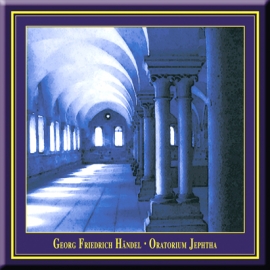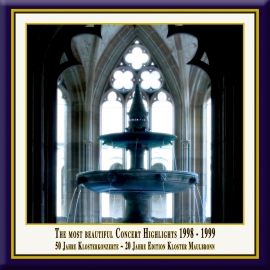
A splendidly atmospheric recording
The oratorio Jephta was George Frideric Handel's last large work, written in 1751 in London and first performed at Covent Garden in the following year. This dramatic and poetic work in three movements reflects the inner aspect of Jephta's unsolvible solitude when he is expelled from Gilead by his half-brothers and grows up in exile. This splendidly atmospheric recording was made at the medeieval Monastery Maulbronn in Germany and fully captures the music's great force and beauty. The performers here include Emma Kirkby (soprano), Melinda Paulsen (mezzo-soprano), Charles Humphries (alto), Julian Podger (tenor), Stephen Varcoe (bass), together with the Barockorchester der Klosterkonzerte, Maulbronner Kammerchor, and conductor Jürgen Budday.
New Classics UK

Clear and beautiful
In this public performance of his last oratorio, recorded and performed at the church of monastery Maulbronn in Germany, the sound is very clear and beautiful...This K&K issue is pleasurable a worthwhile addition to the work´s discography...
John T. Hughes, International Record Review

***** I could not be happier with this superb recording
I have been listening to Jephtha and Samson quite extensively, and I must say that these two recordings are truly impressive. First, the cast of soloists is an absolutely superb assembly of historically-informed performers. It would be hard to find singers any better than Emma Kirkby, Steven Varcoe, Michael Chance. I found all of the performances by the soloists nearly impeccable.
Second, I suspected that the recordings themselves might be filled with ambient and background noises since these were the result of live performances.
I have been extremely pleased with the technical aspects of the recordings: they are 'clean' and clear with very little extraneous sounds. The engineering of these recordings is highly commendable!!
Finally, the orchestral playing by the Barockorchester der Klosterkonzerte and the participation of the Maulbronner Kammerchor are nearly flawless. The string playing is especially strong, and the choruses - filled with drama and emotion - are executed at the highest possible level. Even the pronunciation and intonation of the English is perfect.
In sum, I could not be happier with these two superb recordings. Already possessing several recorded versions of each of these masterful oratorios, I felt that it would be difficult to match the strength and quality of, for example, the performance under John Elliot Gardiner.
These two new additions by K&K Verlagsanstalt to the recorded Handel repertoire are magnificent models, exemplary of how to bring these monumental works to life for the modern audience. The crisp, clear recording, the excellent engineering, the incredible acoustics, the superb performances make these two of the best Handel compact discs I have purchased in a long time.
I should be most happy if you would keep my name on your mailing list, since I would like to be informed when your fine enterprise releases any more Baroque repertoire. These are performances to be treasured and are of the highest caliber of historically-informed practice.
Thomas R. McCallum (USA) on Amazon.com

Very impressive
Kirkby shines vocaly, this being a performance to emphasise the profound and the serious. The chorus sing strongly, with warm and rounded tone, and firm lines; several of the choral numbers are very impressive, for example the Part I chorus '0 God, behold our sore distress', which has considerable grandeur. The marvellous chorus that ends Part 2, one of Handel's noblest, 'How dark, 0 Lord, are thy decrees, all hid from human sight' (his blindness overcame him as he wrote it) is well sung. Some of the quicker choruses are done with real vigour and confidence, for example 'When his loud voice' and the jubilant final ones.
The resonant church recording enriches the sound of the choir. The orchestra is hearty and the conductor, Jürgen Budday, draws some buoyant rhythms from them in the faster music.
The strongest inducement to buy this set lies in the loveliness of Emma Kirkby's singing. This is no longer the exquisite, delicate thread of sound that it once was, but it is still exquisite and delicate while being much fuller and richer, and her characterisation of lphis, the daughter of Jephtha who 'must a victim fall' because of his 'impious vow' to sacrifice the first person he encounters after victory. Listen to her wonderfully shapely and natural singing of 'Tune the soft melodious lute', for example, or 'Farewell, ye limpid springs and floods', as she movingly welcomes death.
Storgè is sung with strength and clarity by Melinda Paulsen (who also does the Angel air in Part 3). Jephtha himself is well taken by Julian Podger, a very capable singer. He is at his best in the heroic music, such as 'His mighty arm'. Zebul is warmly and sensitively sung by Stephen Varcoe, Charles Humphries provides an able Hamor, duetting gracefully with Emma Kirkby in two numbers.
Stanley Sadie, Gramophone Magazine









